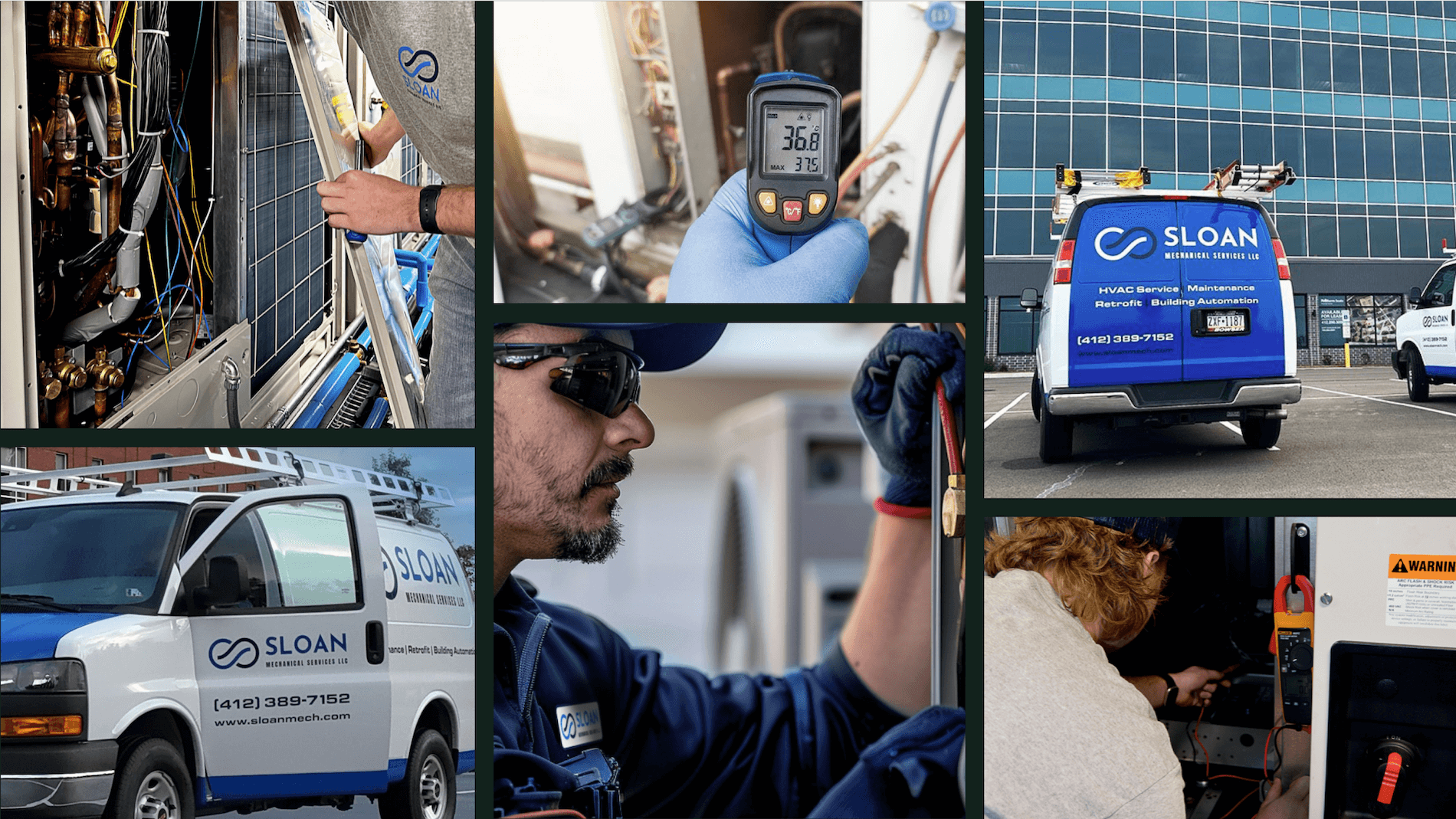Closing HVAC jobs shouldn’t feel like an uphill battle. Whether you're running a small operation or managing a full-scale service team, the right HVAC sales software gives you the tools to generate fast, professional proposals, lock in pricing, and win more jobs without the back-and-forth. Speed matters, but so does accuracy—nailing estimates, tracking customer interactions, and keeping your pipeline moving can be the difference between growth and missed opportunities.
The HVAC industry thrives on efficiency, and that applies just as much to sales as it does to service. Manual quotes, scattered spreadsheets, and outdated paperwork slow everything down. Contractors and sales teams need software that streamlines the entire process, integrates with scheduling, and ensures no lead falls through the cracks. The same technology that’s driving HVAC forward is also transforming electrical businesses, helping them manage sales and service with the same level of precision.
Here’s what we’ll cover:
- Choosing the right HVAC sales software
- 6 key features to look for in HVAC sales software
- Best HVAC sales software for commercial contractors
- Best HVAC sales software for residential
- Best HVAC sales software for general contractors
- Other notable HVAC sales software
- 7 benefits of using HVAC sales software
- 4 important HVAC sales software FAQs answered
Before we dive into the top picks and key features, let’s talk about how to choose the right HVAC sales software for your business.
Choosing the right HVAC sales software
Not all HVAC sales software is built the same, and choosing the right one can be the difference between a smooth sales process and a frustrating experience. HVAC contractors, sales teams, and business owners need a system that works in the field—one that’s fast, mobile-friendly, and built for the way HVAC jobs are sold.
Here are key factors to consider when evaluating HVAC sales software:
- Sales workflow compatibility – Make sure the software supports how your team sells. It should allow for quick, on-the-spot estimates, easy adjustments to pricing, financing, or discounts, and a seamless transition from proposal to job scheduling.
- Ease of use – Complicated software slows down your team. Look for a system that’s intuitive, mobile-friendly, and doesn’t require excessive training. If it’s not easy to use, your team won’t use it.
- Integration with existing tools – Your sales software should work alongside your CRM, scheduling, and invoicing tools. Avoid systems that require manual data entry or force you to juggle multiple platforms.
- Scalability for your business – Whether you’re a small operation or managing multiple sales reps, the software should adapt as you grow. Ensure it can handle the volume of proposals, clients, and job tracking you’ll need over time.
- Essential sales features – Beyond just generating quotes, great HVAC sales software includes automated follow-ups, digital proposals, upselling tools, and contract management to maximize revenue and efficiency.
The right software doesn’t just generate quotes—it helps close deals faster and keeps your team organized. And when it integrates with HVAC CRM software to track leads, follow-ups, and customer history, it becomes even more powerful.
6 key features to look for in HVAC sales software
Selling HVAC services is about giving the right estimates, following up at the right time, and keeping your pipeline organized. A missed follow-up or a slow quote can cost thousands in lost revenue. HVAC contractors and sales teams need software that streamlines their entire sales process, from the first call to the final invoice.
A technician is wrapping up a service call when a homeowner asks about upgrading their aging HVAC system. Without the right tools, the tech would scribble down a rough estimate or tell them, “I’ll get back to you.” But with HVAC sales software, that same tech can pull up equipment pricing, generate a proposal on the spot, and even offer financing options—all before leaving the driveway. That’s how sales should work.
Here are six essential features to look for when choosing HVAC sales software:
1. Mobile access for on-the-spot proposals
A slow response can mean a lost deal. HVAC techs and sales reps need software with mobile access so they can generate quotes, adjust pricing, and send proposals directly from the field. Without a field technician mobile app, they’re stuck calling the office for updates or delaying follow-ups until they’re back at a computer. Whether they’re at a commercial job site or a homeowner’s kitchen table, real-time access to pricing, customer history, and proposal tools ensures they never miss an opportunity.
2. Fast and accurate quoting tools
HVAC sales teams don’t have time to build every quote from scratch. A system with automated quoting software helps contractors pull from pre-set templates, adjust pricing on the fly, and generate professional proposals in minutes. Instead of flipping through catalogs or manually calculating labor costs, they can quickly present customers with clear, itemized options. For commercial HVAC jobs, where bid deadlines are tight and accuracy is critical, having this tool can make all the difference.
3. Sales pipeline tracking
Keeping track of leads through sticky notes and spreadsheets is a recipe for lost revenue. HVAC businesses need a sales pipeline system that organizes deals, tracks follow-ups, and highlights priority opportunities. Without it, a commercial property manager requesting a system upgrade today could easily be forgotten next week. By centralizing leads, sales teams can focus on high-value jobs, maintain momentum, and avoid letting competitors step in.
4. Seamless invoicing and payment processing
Closing a sale is one thing—getting paid on time is another. HVAC companies benefit from integrated invoicing tools that automatically generate invoices from approved quotes, reducing manual errors and billing delays. Combining this with HVAC payment processing allows businesses to offer online and in-person payment options, making it easier for customers to settle their balances. With both systems in place, service teams can spend less time on collections and keep cash flow steady.
5. Automated service agreements for recurring revenue
One of the best ways to increase revenue is by offering preventive maintenance plans, and HVAC service agreement software makes it easy to integrate these directly into proposals. A technician replacing a rooftop unit, for example, can instantly present a customer with a maintenance plan option, ensuring they stay on track with inspections and filter changes. Without an automated system, these opportunities often get overlooked, leading to one-time sales instead of ongoing service contracts.
6. Smart scheduling for sales and service teams
In HVAC sales, timing is everything. Without an efficient scheduling system, reps and techs risk double bookings, missed follow-ups, or gaps in service. A salesperson scheduling a site visit for a large retrofit project, for example, needs to coordinate with field teams in real-time to ensure availability. With connected scheduling tools, everyone stays aligned, preventing miscommunication and unnecessary delays.
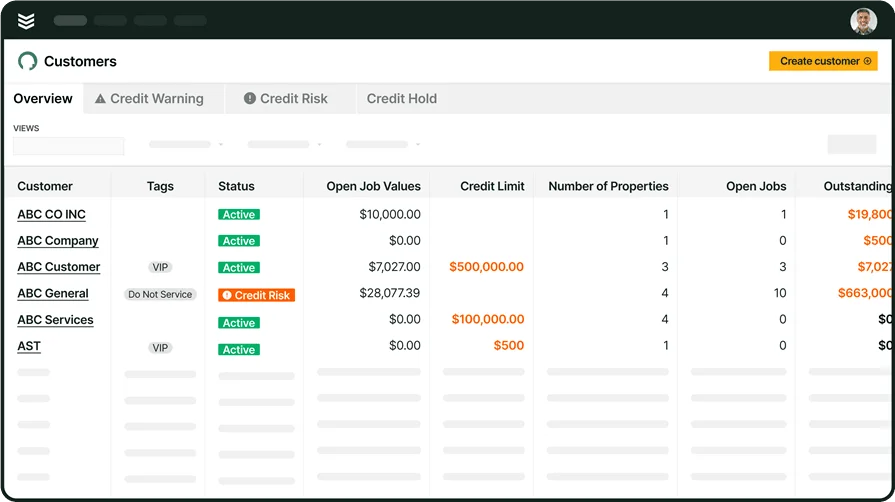
Explore our sales software
Supercharge your sales by empowering your crews with reliable job estimates and bids.
Other notable sales software features for HVAC companies
Beyond the core essentials, there are additional features that can further optimize HVAC sales operations. These tools don’t just improve efficiency—they help contractors, sales teams, and service businesses capture more revenue, reduce errors, and provide a better customer experience.
- Real-time dispatching – HVAC sales teams often coordinate with technicians to finalize deals, especially for complex installations. Having HVAC dispatch software that provides real-time job status updates ensures sales reps stay informed and can adjust proposals accordingly. If a tech finds unexpected ductwork issues on-site, for example, the sales team can update the proposal before work stalls.
- Fleet tracking and management – Sales and service teams are constantly on the move, and keeping track of vehicles ensures operations run smoothly. With HVAC fleet tracking software, businesses can optimize routes, monitor vehicle usage, and ensure sales reps arrive at consultations on time. A sales lead missing an appointment due to poor route planning can mean a lost contract—tracking systems help prevent that.
- Advanced reporting and analytics – HVAC businesses rely on accurate data to refine their sales strategies. With HVAC reporting tools, contractors can analyze conversion rates, track job profitability, and identify which services bring in the most revenue. Understanding trends, such as seasonal fluctuations in equipment sales, allows businesses to adjust pricing and promotions at the right time.
A well-rounded HVAC sales software solution doesn’t just generate quotes—it integrates seamlessly with other business operations to keep sales, service, and operations in sync.
Best HVAC sales software for commercial contractors: BuildOps
For commercial HVAC contractors, managing complex proposals, large-scale projects, and multi-location clients requires more than just a basic quoting tool. BuildOps offers a comprehensive sales platform designed specifically for commercial service businesses, streamlining everything from proposals to scheduling and invoicing. Its integration with dispatching and field service management tools ensures that sales and service teams stay aligned, preventing job delays and miscommunication.
How Pricing Works: We offer live demos weekly, and you can request one whenever it suits you best. This will enable you to explore the features and choose the best solution to meet your requirements.
Features Beyond Sales: In addition to sales tools, BuildOps includes robust project management, technician tracking, and automated work order generation, making it an all-in-one platform for growing commercial HVAC businesses.
What Sets it Apart for Commercial Contractors: Unlike generic sales software, BuildOps is engineered for the complexities of commercial HVAC. It allows contractors to manage multi-site clients, asset tracking, and large-scale service agreements without piecing together multiple tools.
With real-time reporting, sales teams can track performance, identify top revenue opportunities, and refine their approach based on hard data. The system’s seamless job-to-invoice workflow ensures that every closed deal transitions smoothly into scheduling and execution, eliminating costly delays and miscommunication.
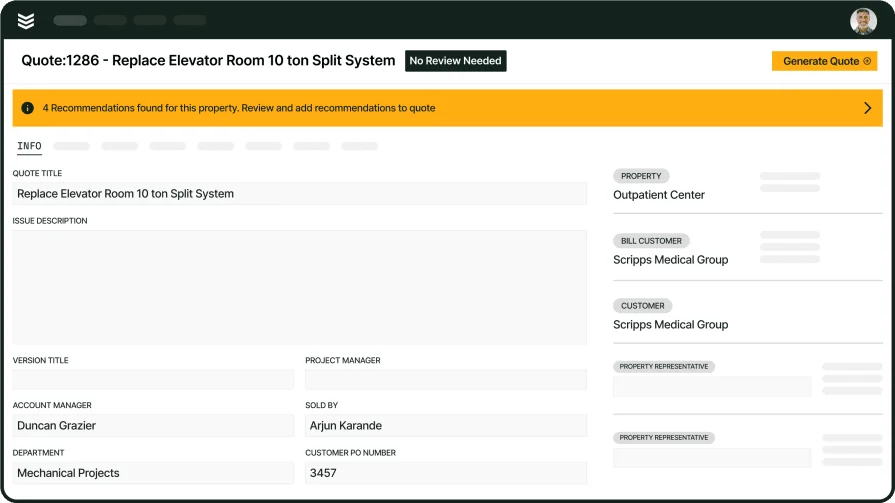
Explore our HVAC sales tool
We help HVAC crews close more deals with accurate quoting and bidding tools.
Best HVAC sales software for residential: Housecall Pro
Image Source: Housecall Pro
Housecall Pro is a solid choice for residential HVAC businesses that need a simple, user-friendly way to generate quotes and manage customer interactions. It offers basic CRM features, automated follow-ups, and online booking, making it ideal for smaller teams focused on high-volume residential service calls. However, it may not be the best fit for large-scale commercial contractors needing advanced multi-job tracking and service agreements—something that specialized platforms like BuildOps handle more efficiently.
How Pricing Works: Housecall Pro operates on a tiered subscription model, with pricing that scales based on the number of users and included features.
Features Beyond Sales: The software includes payment processing, automated appointment reminders, and technician tracking to help streamline day-to-day operations.
What Sets it Apart for Residential: Housecall Pro’s customer self-service portal allows homeowners to approve estimates, schedule services, and make payments online, reducing administrative tasks for HVAC businesses.
Deep Dive
Want to see exactly how BuildOps and Housecall Pro stack up against each other? Check out our head-to-head feature comparison of both tools to see which one’s sales tools are a better fit for your team.
Best HVAC sales software for general contractors: ServiceTrade
Image Source: ServiceTrade
ServiceTrade is a strong option for HVAC contractors who handle a mix of residential and light commercial projects. It provides digital quotes, job tracking, and customer notifications, making it a well-rounded platform. That said, it may not be the best fit for commercial contractors managing large-scale projects requiring advanced asset tracking and real-time reporting—areas where BuildOps excels.
How Pricing Works: ServiceTrade offers a per-user pricing model with different plans based on the level of automation and integrations required.
Features Beyond Sales: The platform includes job scheduling, customer asset tracking, and automated service reminders to improve efficiency across different job types.
What Sets it Apart for General Contractors: ServiceTrade offers strong integrations with accounting and inventory management tools, making it useful for HVAC businesses that handle both sales and service.
Other notable HVAC sales software
While BuildOps is built specifically for commercial HVAC businesses, other platforms cater to different needs within the industry. Some focus on residential sales, while others offer general proposal and estimating tools that work across multiple trades. Here’s a look at a few other notable HVAC sales software options.
Pro Comfort Advisor
Image Source: Pro Comfort Advisor
Pro Comfort Advisor is designed for residential HVAC contractors looking to simplify their sales process. It provides homeowners with interactive proposals, letting them compare system options and financing plans in an easy-to-understand format. This makes it a solid choice for residential-focused contractors who want to close deals faster. However, it lacks the robust project tracking and large-scale service agreement management that commercial HVAC businesses require.
How Pricing Works: Pricing varies based on features and user access, with different tiers for solo contractors versus larger teams.
Features Beyond Sales: In addition to proposal creation, Pro Comfort Advisor offers built-in financing options and real-time homeowner engagement tools.
What Sets it Apart for Residential HVAC: The platform is designed to give homeowners a simple, visual way to choose their HVAC system, making it ideal for high-volume residential sales teams.
Conduit Tech
Image Source: Conduit
Conduit Tech focuses on digital sales enablement, offering AI-powered tools to streamline the HVAC quoting process. It allows contractors to create dynamic proposals and present detailed system comparisons to customers. While it’s useful for speeding up the residential sales cycle, it doesn’t provide the in-depth job tracking or operational insights that commercial HVAC businesses often need.
How Pricing Works: Subscription-based pricing with different tiers depending on business size and usage.
Features Beyond Sales: The platform includes AI-driven recommendations, sales performance analytics, and automated follow-ups.
What Sets it Apart for HVAC Sales: Conduit Tech’s AI-powered approach helps residential contractors close deals faster by providing automated insights and system recommendations.
PandaDoc
Image Source: PandaDoc
PandaDoc is a general proposal software that HVAC contractors can adapt for sales purposes. It’s widely used across multiple industries for document automation, e-signatures, and contract management. While it offers flexibility, it lacks industry-specific tools like automated equipment pricing, financing integration, or service agreement tracking—features that HVAC-focused platforms include natively.
How Pricing Works: PandaDoc offers a tiered pricing model based on document volume and features, with enterprise plans for larger organizations.
Features Beyond Sales: In addition to proposal generation, PandaDoc includes e-signatures, workflow automation, and document tracking.
What Sets it Apart for HVAC Sales Teams: The software is best suited for contractors who need a customizable document solution rather than an HVAC-specific sales platform.
Each of these platforms offers unique benefits, but the right choice depends on your business needs. Up next, we’ll break down the 7 key benefits of using HVAC sales software and how it can help contractors win more jobs and increase revenue.
7 benefits of using HVAC sales software
Selling HVAC services is more than just providing estimates—it’s about running a seamless, professional sales process that wins more jobs. HVAC sales software helps contractors streamline proposals, manage follow-ups, and close deals faster, all while reducing costly mistakes. For HVAC business owners, techs, and sales teams, the right software isn't just a convenience—it’s a game-changer.
Imagine an HVAC tech finishing a repair when the customer asks about upgrading their system. Instead of saying, “I’ll get back to you,” they can pull out their tablet, generate an accurate quote in minutes, and offer financing options—all before leaving the driveway. That’s the power of having the right tools at your fingertips.
Here are seven key benefits of using HVAC sales software:
1. Faster, more accurate estimates
Manually creating quotes takes time and leaves room for errors. With automated HVAC quoting tools, contractors can generate professional, itemized proposals in minutes. Whether it's residential replacements or large commercial installations, automated calculations ensure pricing is accurate, preventing costly underquoting or overquoting.
2. Increased conversion rates
A slow sales process leads to lost opportunities. HVAC sales software helps businesses respond to inquiries faster, provide instant proposals, and follow up automatically. Customers are more likely to sign a deal when they receive a professional, well-documented proposal without waiting days for a response.
3. Seamless financing integration
Customers often hesitate to approve HVAC system upgrades due to cost. With built-in financing options, HVAC sales teams can present payment plans on the spot, making high-ticket purchases more accessible. This feature alone helps contractors close more deals while improving customer satisfaction.
Check out the different accounting system integrations with BuildOps–streamline your operations without disrupting your workflow.
4. Better lead and pipeline management
Chasing leads through spreadsheets or paper notes leads to missed sales. A dedicated HVAC sales pipeline allows teams to track every lead, schedule follow-ups, and prioritize high-value opportunities. By keeping the sales process organized, businesses can ensure no potential job slips through the cracks.
To learn more about lead and pipeline management, check out this article about how to unleash your sales potential with BuildOps’ Pipeline+ for HVAC businesses.
5. Improved communication between sales and service teams
When sales and service teams operate in silos, miscommunication can cause scheduling conflicts or incorrect job details. HVAC sales software integrates with dispatching and service management tools, ensuring that closed deals transition smoothly into scheduled jobs without errors or miscommunication.
6. Automated service agreement upsells
Recurring revenue is key for HVAC businesses, and upselling maintenance agreements is one of the best ways to secure it. Sales software can automatically suggest service contracts as part of the proposal process, increasing long-term revenue and improving customer retention. Learn more in our guide on HVAC service agreement software to see how it helps with streamlining your contracts.
7. Stronger data and performance tracking
Knowing what works—and what doesn’t—is critical for growth. HVAC sales software provides insights into conversion rates, average deal size, and customer trends, helping business owners refine their sales strategies. With real-time reporting, teams can identify top-performing sales reps and adjust pricing or promotions based on actual data.
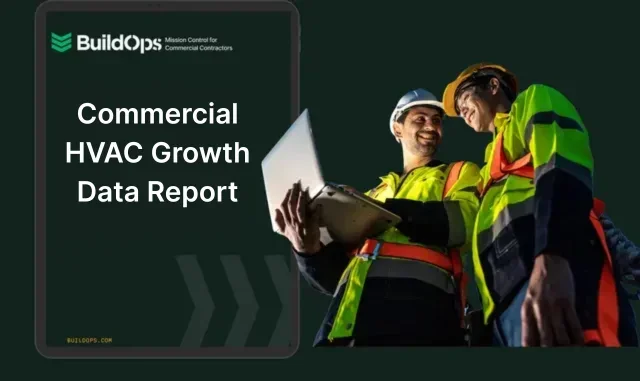
Get the HVAC Growth Report
Get leading insights from HVAC pros that have successfully scaled their business.
4 important HVAC sales software FAQs answered
Choosing the right HVAC sales software can be overwhelming, especially with so many options available. Here are answers to some of the most common questions HVAC professionals ask about sales software.
1. What is HVAC sales software?
HVAC sales software helps contractors and sales teams create estimates, manage proposals, track leads, and close deals faster. It streamlines the sales process from quoting to financing, ensuring accuracy and efficiency. Many solutions also work with field service tools for seamless job execution.
2. How does HVAC sales software work?
HVAC sales software automates and organizes the sales process by:
- Quick quoting: Generate detailed, itemized proposals in minutes instead of manually building estimates.
- Lead tracking & follow-ups: Organize leads, automate follow-up reminders, and track deal progress in a centralized system.
- Integrated financing: Offer customers financing options on the spot, making higher-ticket HVAC services more accessible.
- CRM functionality: Store customer history, past job details, and communication logs for better engagement and upselling opportunities.
- Job transition & scheduling: Ensure seamless handoffs from sales to service by integrating with dispatching and scheduling software, reducing miscommunication between teams.
- Performance analytics: Track conversion rates, sales trends, and team performance to refine pricing strategies and improve close rates.
3. Who needs HVAC sales software?
HVAC sales software benefits more than just sales reps—it plays a crucial role in keeping operations smooth and ensuring every lead is properly managed. Here’s who benefits the most:
- HVAC contractors: Speed up quoting, eliminate pricing errors, and improve customer experience.
- Sales teams: Manage prospects, automate follow-ups, and ensure no potential deal slips through the cracks.
- Business owners: Gain insights into sales performance, track revenue trends, and scale operations efficiently.
- Technicians: Present accurate estimates on-site and upsell maintenance plans directly from the field.
4. Should you get a stand-alone HVAC sales software, or an all-in-one FSM software with sales capabilities?
A stand-alone HVAC sales tool is great for businesses focused primarily on closing deals. However, for contractors managing both sales and service, an all-in-one FSM platform with built-in sales tools offers greater efficiency. It keeps sales, dispatching, and job execution connected—reducing data entry and improving workflow across teams.
The right HVAC sales software isn’t just about generating quotes—it’s about building a system that helps contractors close more deals, eliminate bottlenecks, and keep sales and service teams aligned. From automated proposals and lead tracking to integrated financing and real-time analytics, these tools make selling HVAC services faster and more efficient.
However, many standalone sales platforms fall short when it comes to seamless integration with field operations. That’s where BuildOps stands out. Designed for commercial HVAC businesses, it brings sales, scheduling, dispatching, and invoicing under one roof—eliminating the need for multiple disconnected tools. With everything in one place, teams can move from quote to completed job without missing a step.
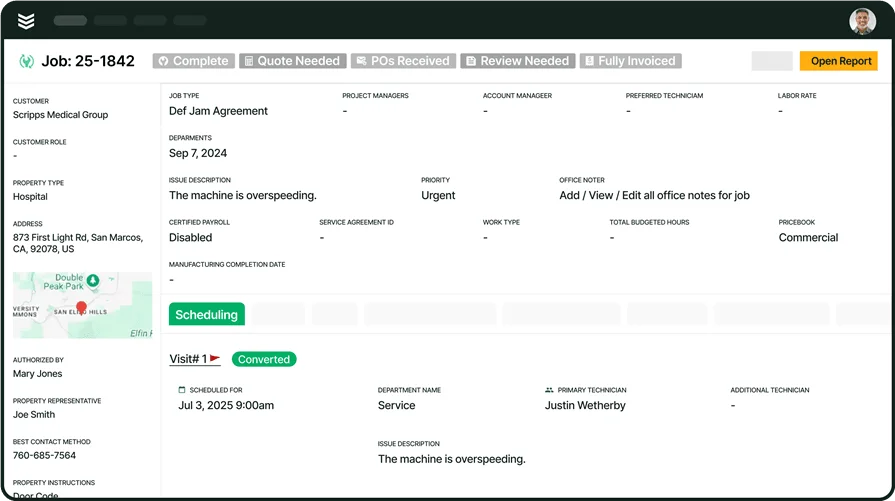
Looking to upgrade your sales process?
We help HVAC contractors streamline their workflow so they can get more done.





